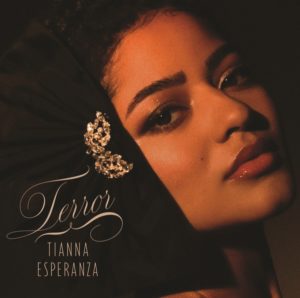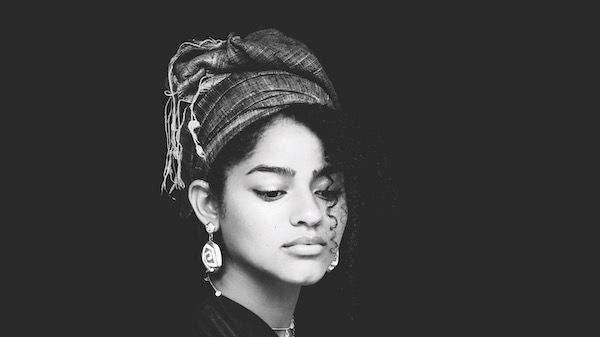Anyone who was lucky enough to be at the Mews in Provincetown on March 9, 2020 may have witnessed the early stages of a supernova. When Tianna Esperanza performed at the Coffeehouse open mic that night, she had already released a handful of well-received singles while attending Lesley University in Cambridge after graduating from Barnstable High School in 2017.

Three years later, Esperanza’s debut album, Terror, released on Feb. 17, has received notable praise. Spin selected her as one of 15 artists to watch in 2023, and a critic for Beats Per Minute gave the album an “early vote” for Album of the Year. NPR music critic Ann Powers was even more emphatic in her praise: “We’re going to be coming back to this at the end of 2023 and say: was there a more arresting debut?”
Born and raised on Cape Cod, Esperanza seems poised to take the music world by storm with this ferocious body of work. The album’s title track immediately puts the listener on notice with its stunning opening lines: “Sometimes when I’m walking/ and a man looks at me/ I think of all the ways/ I could make them bleed,” Esperanza sings in a buttery falsetto. By the time a plucky guitar track comes in half a minute later, the gauntlet has already been laid down: enter Esperanza’s musical world and prepare to be pricked.
At once towering and tender, broadly trenchant and finely detailed, Terror is a cathartic piece of emotional and social excavation. The album directly confronts Esperanza’s personal trauma, including sexual assault and the death of a sibling, alongside meditations on love, Black power, sexuality, and desire. The result is an immense feeling of unburdening, with deep gravity yoked to hypnotic joy.
Slipping from neo-soul stylings to spoken-sung jazz phrasing and propulsive raps with ease, Esperanza’s sinuous voice wraps itself as convincingly around innuendo as around grief. The 22-year-old vocalist and instrumentalist has cited Nina Simone and Eartha Kitt as models, and the album’s visuals feature Esperanza in a ’50s-inspired pinup look. But her music is entirely her own, combining elements of jazz, folk, and hip-hop of the past and present to create an infectiously original sonic palette. The album pays homage without ever becoming derivative.
Much has been made of Esperanza’s musical pedigree. Her grandmother, with whom she is close, is Paloma McClardy (a.k.a. Palmolive), the Spanish drummer who founded the London punk band the Slits and later performed with the Raincoats. Nowhere is this influence clearer, both literally and stylistically, than on “Princess Slit and the Raincoat Prince,” a sexy and swaggering track that unfolds over a relentless bass line as Esperanza glides her shape-shifting tone over reflections on her own multifaceted queerness.
The mélange of Esperanza’s personal and musical touchstones unfolds through the album’s middle run, from “Lewis” — a song inspired by footage of poet Lewis H. Michaux in Göran Olsson’s 2011 documentary The Black Power Mixtape 1967-1975, which has garnered comparisons to Gil Scott-Heron — to “Granada,” in which Esperanza croons in Spanish over flamenco-inflected guitars.

Esperanza is biracial and was raised by her white mother, who has Spanish and Scottish roots. These songs collectively paint a picture of how the complexities of her mixed racial identity, which she’s often discussed in interviews, have influenced her artistic expression.
Two standout tracks — “Buy You a New Attitude” and “Three Straight Bitches From Hell” — seem like the fullest encapsulation of Esperanza’s musical future. Both are wordy, intricate compositions with a wry sense of humor. Yet Esperanza’s voice takes on totally different personas in each: slinky and modulated one moment, deep and raspy the next. The two songs sound nothing like each other yet are both clearly products of a singular and almost undefinable musical imagination, as if Sade and Leonard Cohen joined the same 1940s big band.
Terror culminates in three consecutive duets with fellow singer-songwriters. The first, a delicate ballad with Irish artist Mick Flannery, features sumptuous harmonies. The second, a sparse collaboration with Rachel Yamagata, meditates on solitude — and perhaps life on Cape Cod —as Esperanza sings “I know the sound of waves so well.” “Lone Child,” the album’s closing track, finds Esperanza trading exuberant phrases with her musical mentor Valerie June over rhythmic percussion.
After tracing the emergence of a confident musician deftly wielding the fullness of her personhood, the album’s third act suggests that Esperanza is an artist’s artist: an uncompromising talent who will likely pave her way through the industry by forging community rather than prioritizing individualism. With Terror, new collaborators — and fans — will surely be lining up for her.


